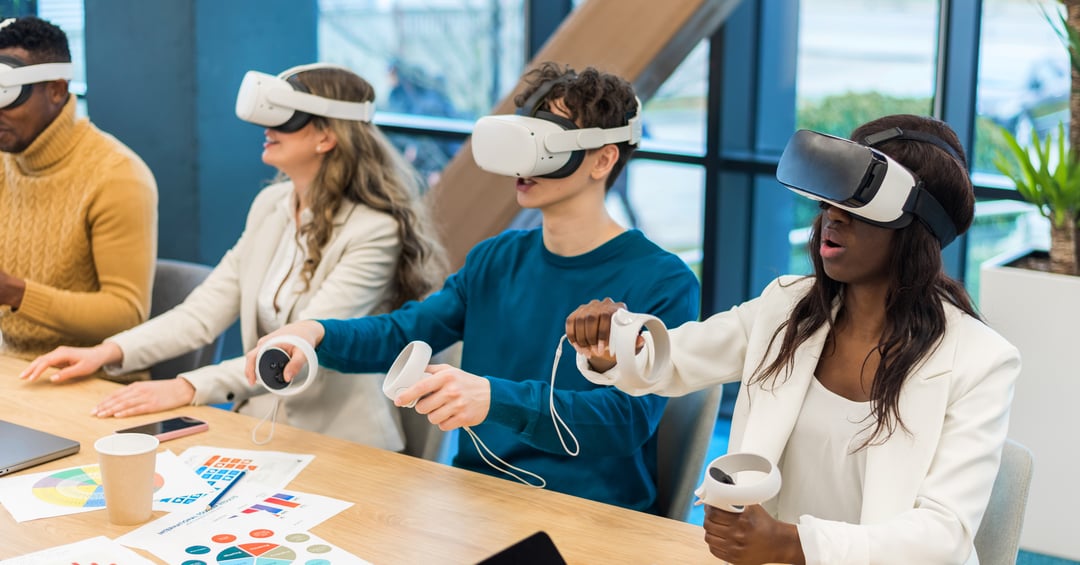JFFLABS
XR Technology for Small Businesses
A playbook for small business leaders to reach business outcomes, train their employees, and empower their community.
While small businesses have typically not been the main audience for extended reality (XR) developers, we anticipate increased interest in the coming years, creating a more viable marketplace. After all, small businesses represent a large share of the U.S. workforce, with over 60 million employees who could be trained. This, combined with community education and growing interest in XR, allows for a flourishing ecosystem where small businesses use the latest technological developments to achieve desired outcomes for themselves and their communities and provide quality jobs.
As critical players in the U.S. economy, small businesses, employees, and the community must have access to XR technology and a seat at the table to influence its development and use.
We’re seeing large businesses successfully implement XR technologies to train their employees. To ensure access to these technologies is truly equitable, small businesses must also be able to use them and inform their creation.
JFF’s playbook is intended to be a resource for small business owners, policymakers, small business service providers, and others in the small business community who are interested in how XR technologies like virtual reality (VR) and augmented reality (AR) can support business goals, help train employees, and empower communities.
In this playbook, we share our key learnings from recent JFF XR pilots and offer recommendations for small businesses and their ecosystems to shape and benefit from XR. Though small businesses provide the majority of jobs in the U.S. economy, their employees often do not receive the benefits of emerging technologies, whether for training or for making their day-to-day jobs more efficient and effective.
What is XR Technology?
Extended reality broadly describes technologies that blend the physical and digital worlds, including augmented reality (AR), virtual reality (VR), and mixed reality (MR). This playbook will focus mostly on VR, given its high impact on training, accompanied by some AR use cases. While many people might associate XR with media and gaming, it’s also used in a range of other industries, from manufacturing to health care, to provide training, education, and support for on-the-job tasks. Immersive learning is used not only in schools but also in workplaces.
- AR technology overlays digital images on real/physical images, meaning the user experience combines both worlds.
- VR technology allows users to immerse themselves fully in virtual worlds, providing 360-degree views.
- MR technology allows virtual and real objects to coexist, going beyond AR and enabling users to manipulate virtual objects within a physical space.
XR training has numerous benefits for small businesses and their employees. This playbook is organized in two parts to provide small businesses with 1) a tactical guide for implementing training via XR technologies and 2) strategies for using XR technologies to support small business goals.

The how-to guide details how small businesses can provide skill development and career growth opportunities for their employees via XR technologies. We dive specifically into VR, sharing lessons from our recent pilot program with small businesses nationwide.
In the first section of the playbook, we look inward to small businesses, helping them to:
- Assess readiness
- Select a VR solution
- Implement and see impact
The voices of small businesses and their communities are integral to—but often missing from—the XR market.
In the second section of the playbook, we look outward to the ecosystem.
We broaden our discussion by sharing other ways small businesses can use XR to accelerate their business goals and how they can take advantage of opportunities to shape and influence the development of these technologies so they can serve everyone.
This report is made possible through the support of Meta. Jobs for the Future (JFF) and Meta are working together to better understand and showcase the potential of extended reality (XR) technologies to transform learning and work, especially for those facing systemic barriers that affect their access to leading-edge technologies.
For more information about JFF’s partnership with Meta, visit www.jff.org/xr.
About JFFLabs Insights
JFFLabs Insights helps decision-makers to understand and prepare for the emerging trends shaping the future of work and learning. Our rapid insights process and our transformative research agenda focus on core areas impacting the future of work and learning and help our partners stay at the head of the field.
For more information about JFFLabs Insights, visit www.jff.org/insights.
Contributors and Authors
Alex Swartsel
Managing Director, Insights, JFFLabs, Center for Artificial Intelligence & the Future of Work
Jennifer Giffels
Director, Solutions Design & Delivery, JFF
Lucy Fernandez
Manager, Solutions Design & Delivery, JFF
Taelyr Roberts
Senior Manager, Solutions Design & Delivery, JFF
Lisa Eichel
Director, Solutions Design & Delivery, JFF
Zahra Amanpour
Senior Advisor, JFF
Carlin Praytor
Project Manager, Communications, JFF
Special thanks to Jason Schunkewitz and Tyler Nakatsu.




